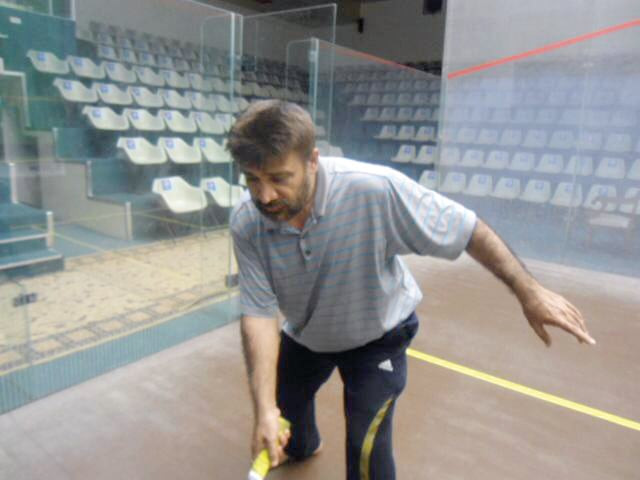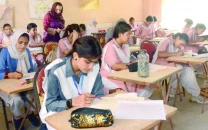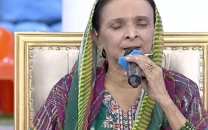Of hope, deceit and lost chances — Irshad Khan relives his glory days
A gifted squash player reminisces his days in the courts, of adventures and misadventures that came with the sport

The stage was set. There was a deafening silence among the crowd of over 200 as it looked through the glass walls of a court. It was the championship point for Irshad Khan as he threw the ball two feet into the air for service and hit it with his racket with such force that it bounced back from the wall at lightning speed, causing his opponent to miss it completely.
Khan dropped to his knees, raised both his arms in the air as his friends poured into the court and lifted him up on their shoulders. It was the year 1992 when Khan won a squash league tournament in Johannesburg, South Africa.
Pakistani players triumph at Borneo Junior Open Squash Tournament
"I was very happy and proud that I was able to win the tournament," said Khan. "I kissed my green shirt and thanked the Almighty."
Khan was born in Karachi in 1966. Sitting next to the glass wall of a squash court with a racket in his lap, clothed in a faded blue sweat-shirt and off-white trousers, Khan, 5 feet 8-inch-tall with broad shoulders and thick wavy brown hair, recalls the early years of his life when he had been an aspiring cricketer.
"I never liked squash," says Khan as he looks down at his racket. "When I was a kid I loved to play cricket and I was a very good all-rounder."
Humble beginnings
Times were tough for him in his late teens. Khan's father depended on him as his salary wasn't enough to keep the kitchen running for the family of six. His mother, even though she could stich clothes very well, wasn't allowed to use her talent.
One of his siblings, Akbar Khan, 49, remembers how Irshad was resilient when their family went through those tough days.
"I remember abba [dad] used borrowed a tanga [horse carriage] from our neighbours on alternate days," recalls Akbar. "It was joyous for us as we got to play with the horse but Irshad was the one who rode it for the entire day as a taxi."
Off to Johannesburg
Though the tunnel was long and dark, there was light at the end of it. His uncle, Sultan Mehmood, helped Khan get a job as a tennis ball-boy at Modern Club, Karachi, where he worked for a year starting from 1983.
"I worked there for six hours, earning about 120 rupees per month," says Khan. "I was happy because now I had a steady and better income. I also had the chance to play tennis and squash in my spare time. But I only used to do wall-practice as no one would want to play with me."
Seeing Khan play squash one day, Roshan Khan, a former British open champion, recruited him to Fleet Club as a junior assistant in 1984 and trained him.
"I could not believe that Roshan Khan was my mentor," said Khan. "My game got better, more people wanted to play with me. It seemed that my life had a purpose and direction now."
Khan worked at Fleet Club for eight years till 1992 before getting a call from his friend in South Africa who asked him to come and make a career in squash. He discussed the opportunity with his mentor and with his blessings, Khan went to Johannesburg.
Of deceit and deception
A multi-cultural and multi-ethnic city, Johannesburg, as Khan reminisces, lived up-to its nick name 'city of gold', where hundreds of street traders earned their living under the shadow of tall buildings. It was also a dangerous city as Khan recalls an incident with a nervous smile on his face.
"I was walking back home from a sports shop when four people jumped at me. They were tall and very dark. They had a big sliver dagger which they pointed right towards my stomach," said Khan as his eyes widened. "They shouted 'rand!', 'rand!'- 'money!', 'money!' They stripped me naked and took my clothes also."
During his 10-month stay in South Africa, Khan also worked as a shoe salesman at a local plaza. It was there he met Rashida Rasool, a barrister, who had seen Khan play at a local club. She was tall, had light green eyes and dark black hair.
"I was a young man back then. I used to beat ranked players over there. She was impressed by that I guess," said Khan with a smile on his face. "She was also very beautiful. I liked her hair specially, but I didn't accept her marriage proposal due to her high status as I was just a squash player and she was a barrister."
Pakistan en route making squash champions again: Jansher Khan
Khan thought he would be able explore more opportunities as a squash player if he became a South African citizen. He asked one of his acquaintances to do the necessary paperwork on his behalf. Khan spent better part of his hard-earned money in pursuit of becoming a South African citizen, but his acquaintance deceived him and was never to be found again.
"I was heart-broken," said Khan clenching his jaws. "Seeing security and financial issues, I didn't know what to do, so I decided to come back to Pakistan. My friends did try to stop me from taking such a rash decision, but I just did not want to stay there anymore."
Content at home
In November 1993 Khan came back to Pakistan, got married and remained jobless for a whole year. "That was the worst year of my life," said Khan, "I worked as a mason and ward boy at Jinnah Hospital. I thought I was wasting my life."
In 1994, Khan got a job as a coach at Creek Club which he has been doing it ever since.
"Jahangir Khan once told me that I have a champion's game," said the 52-year-old. "But I did not have enough money to train myself to be one so I became a coach. I am content with how my life turned out. I would not trade it for anything."
This story is part of a weekly series that seeks to bring to light the unsung heroes of Karachi - the hawkers, traders, doctors, teachers, engineers, lawyers and daily-wage labourers. It is they who make Karachi the city of lights.
Author tweets as @jt76007 (https://twitter.com/jt76007)



















COMMENTS
Comments are moderated and generally will be posted if they are on-topic and not abusive.
For more information, please see our Comments FAQ